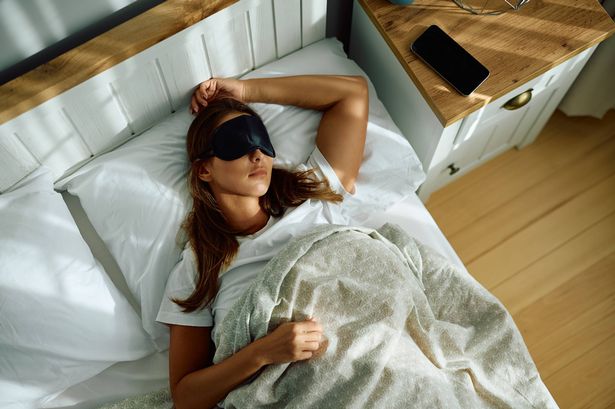Health
Discover a Simple Eye Technique to Fall Asleep Fast

Millions of people struggle to fall asleep each night, grappling with distractions from daily life and racing thoughts. A recent social media post by Heather Gordon offers a straightforward technique that she claims can help individuals drift off to sleep quickly. Her method has garnered attention for its simplicity and effectiveness, with many users reporting positive results.
Gordon shared a video on Instagram outlining her approach, which she says can work every time. Although she primarily uses it when waking up in the middle of the night, it can also assist those who have difficulty falling asleep initially. The technique involves a series of eye movements performed with closed eyelids, which Gordon believes helps to calm the mind and induce sleep.
To execute the method, one simply closes their eyes and moves them in a specific sequence: first looking up, then down, followed by left and right movements. After this, one should roll their eyes in a large circle in one direction and then in the opposite direction. The final step involves bringing the eyes to the center, akin to crossing them, before repeating the entire process until sleep sets in. Gordon confidently stated, “I have never made it past two cycles of this without falling asleep.”
Responses to her post have been overwhelmingly positive, with many users expressing their surprise at how effective the technique is. One commenter noted, “I did it this morning around 5 a.m. and it really works,” while another added, “I almost fell asleep just practicing! Wow! Goodnight!” A third individual shared that they learned this technique from a Reader’s Digest article over 50 years ago and have found it effective ever since.
Additional Strategies for Better Sleep
In conjunction with Gordon’s technique, the NHS’s Every Mind Matters campaign offers various suggestions to improve sleep quality. Establishing a solid bedtime routine is critical; this includes setting a regular time for winding down and going to bed. Consistency in sleep schedules can significantly enhance overall sleep quality.
Another recommended strategy is to avoid electronic devices for at least an hour before bedtime. The blue light emitted by screens can interfere with the body’s natural sleep cycle. Instead, engaging in relaxing activities such as reading, listening to calming music, or practicing meditation can promote better sleep.
If sleep does not come easily, it is advised not to force it. If one finds themselves tossing and turning, it may be beneficial to rise and engage in a calming activity until feeling sufficiently tired.
Lastly, diet and exercise play significant roles in sleep quality. Maintaining a balanced diet and incorporating regular physical activity can foster relaxation. It is advisable to avoid heavy meals and stimulants like caffeine, alcohol, or nicotine in the hours leading up to bedtime.
In summary, whether through simple techniques like those shared by Heather Gordon or established recommendations from health organizations, there are numerous ways to improve sleep quality. Implementing these strategies may help many individuals achieve a more restful night.
-

 Health3 months ago
Health3 months agoNeurologist Warns Excessive Use of Supplements Can Harm Brain
-

 Health3 months ago
Health3 months agoFiona Phillips’ Husband Shares Heartfelt Update on Her Alzheimer’s Journey
-

 Science1 month ago
Science1 month agoBrian Cox Addresses Claims of Alien Probe in 3I/ATLAS Discovery
-

 Science1 month ago
Science1 month agoNASA Investigates Unusual Comet 3I/ATLAS; New Findings Emerge
-

 Science4 weeks ago
Science4 weeks agoScientists Examine 3I/ATLAS: Alien Artifact or Cosmic Oddity?
-

 Science4 weeks ago
Science4 weeks agoNASA Investigates Speedy Object 3I/ATLAS, Sparking Speculation
-

 Entertainment4 months ago
Entertainment4 months agoKerry Katona Discusses Future Baby Plans and Brian McFadden’s Wedding
-

 Entertainment4 months ago
Entertainment4 months agoEmmerdale Faces Tension as Dylan and April’s Lives Hang in the Balance
-

 World3 months ago
World3 months agoCole Palmer’s Cryptic Message to Kobbie Mainoo Following Loan Talks
-

 Science4 weeks ago
Science4 weeks agoNASA Scientists Explore Origins of 3I/ATLAS, a Fast-Moving Visitor
-

 Entertainment4 months ago
Entertainment4 months agoLove Island Star Toni Laite’s Mother Expresses Disappointment Over Coupling Decision
-

 Entertainment3 months ago
Entertainment3 months agoMajor Cast Changes at Coronation Street: Exits and Returns in 2025









